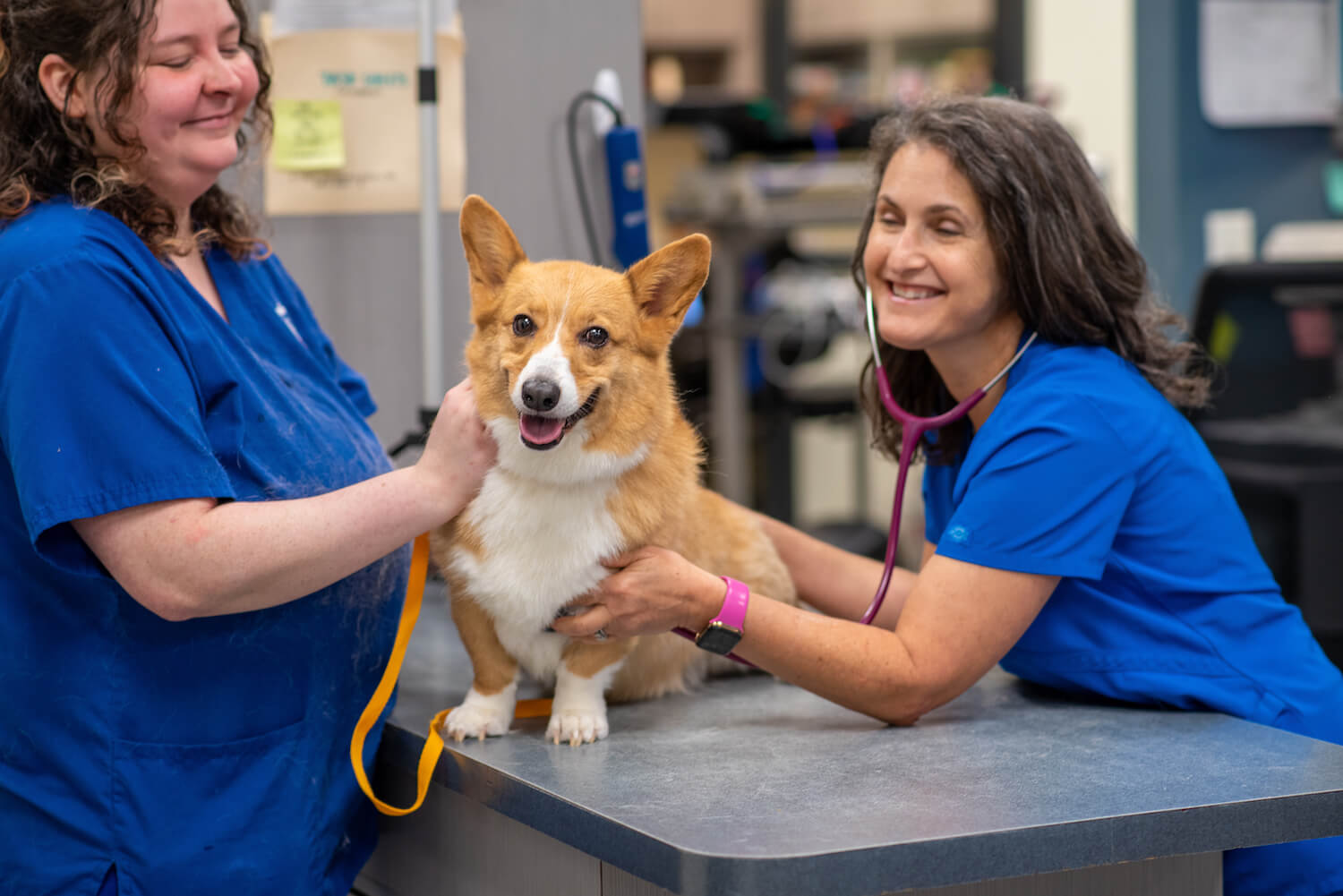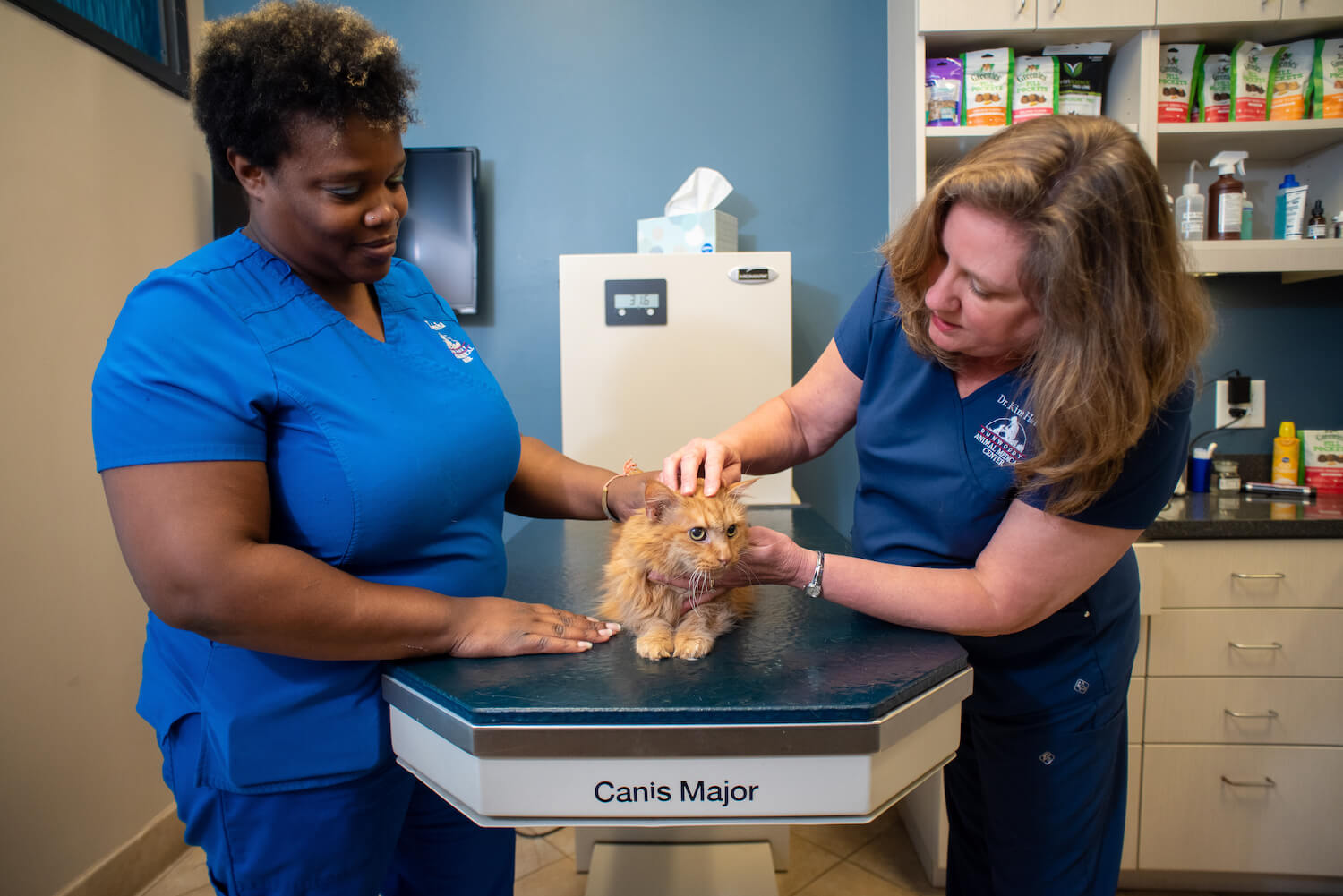Annual examination of our patients provides the cornerstone for a long and healthy life. These exams allow us to discuss everything that may be going on in your pet’s life. The physical exam allows us to look and listen for things that may warrant lifestyle changes, dietary suggestions, or further exploration of the findings.
Diagnostic bloodwork provides us with a window into the areas we cannot examine physically, and can often uncover early issues that can be addressed simply before they become life altering. Vaccinations, if any are needed, can also be given at this time, however it is the history, examination, and bloodwork that make up the essentials of lifelong care.
Like people, pets advance through several stages as they grow older. As your veterinary care provider, we are here to help you navigate through these years with your pet, in an effort to make his or her life as healthy and happy as possible.
Standards of Care for Annual Wellness Visits
As veterinarians we are allowed to develop our own sets of standards of care for our patients. Using the guidelines established by the American Veterinary Medical Association, the American Animal Hospital Association, the Feline Veterinary Medical Association, and the Georgia Veterinary Medical Association, the following protocols are our standard of care for annual wellness exams:
 Dogs
Dogs
- Rabies vaccine every 1 or 3 years, based on a patient’s age and lifestyle
- DHPP vaccine every 3 years, possibly longer, based on a patient's age and lifestyle
- Bordetella vaccine annually, if needed for boarding and/or grooming (check with your boarding/grooming facility for their requirements)
- Influenza vaccine annually, if needed for boarding and/or grooming (check with your boarding/grooming facility for their requirements)
- Leptospirosis annually, based on a patient's lifestyle and age
- Lyme annually, if pet is traveling to endemic areas
- Annual heartworm test even if taking preventative
- Annual fecal exam
- Annual Wellness Blood Profile: We have 3 levels of profiles which are given based on the age of the patient. The profiles become more in depth as the patient ages. These profiles allow us to thoroughly evaluate the health of our patients, going beyond what a physical exam will reveal.
 Cats
Cats
- Rabies vaccine every 1 or 3 years, based on a patient’s age and lifestyle
- FVCRP vaccine every 3 years, possibly longer, based on a patient’s age and lifestyle
- Feline Leukemia every 3 years for cats that go outdoors
- Annual fecal exam for indoor cats and annual therapeutic deworming if outside cats
- Annual Wellness Blood Profile at 1 year of age and then annually starting at 6. We have 2 levels of profiles which are given based on the age of the patient. The profiles become more in depth as the patient ages. These profiles allow us to thoroughly evaluate the health of our patients, going beyond what a physical exam will reveal.
- Annual deworming for cats that go outdoors
Puppy & Kitten Care
There are few more exciting moments in your life than that moment when you finally pick out and take home a new puppy or kitten. There’s so much to learn and do regarding basic preventative healthcare, feeding, grooming, and training. Over the period of the initial visits we can address all of your concerns and questions and educate you on what needs to be done to ensure that this wonderful puppy or kitten develops into a wonderful dog or cat and stays with you for many years to come.
Adult Care
Regular annual checkups and wellness exams are critical to your pets’ well-being. These wellness exams give us a chance to evaluate the overall health of your pet while also giving us a baseline for their unique bodies and tendencies. Not only do these exams keep us up-to-date with your pets’ health, but they also allow us to detect potential problems before they become serious. This thorough checkup gives us vital information to help keep your pet healthy!
Senior Care
When it comes to protecting your senior pet’s health, there is no substitute for bringing him or her in for yearly examinations. During this time, our veterinarians and staff will be able to carefully examine your pet and identify what may seem to be minor or insignificant changes that could actually signify a potential health risk. While totally eliminating these potential health threats is often not possible, early detection and treatment can improve your pet’s chances of survival and extend his or her life expectancy.
Vaccination Protocols
Going to the vet repeatedly for vaccinations may seem like an inconvenience, but the diseases that vaccinations will shield our pets from are dangerous, potentially deadly, and, thankfully, largely preventable. With so many different diseases and vaccinations, it can sometimes be confusing to know which vaccinations your pet needs and which ones are important but optional. At Dunwoody Animal Medical Center, we prefer to take a conservative and balanced approach to annual wellness visits by customizing each pet’s vaccination schedule according to its lifestyle (whether the dog is boarded or groomed frequently, goes to dog parks regularly, goes hiking or swimming often, etc.).
Titer Testing
To help ease concerns about over-vaccination, Dunwoody Animal Medical Center also offers titer testing. Titers are the measure of antibodies in your pet’s immune system, and a high number of antibodies to a certain illness may indicate that your pet is still immune from that disease. However, these tests can be somewhat misleading because the number of antibodies your pet has is not a completely accurate view of their immunity nor does it predict any future protection from those illnesses. While titers do have their uses, we prefer to vaccinate pets according to protocols set by leaders in the field to provide safe, effective protection. It is important to note that Georgia does not accept titer testing in lieu of a current rabies vaccine.

